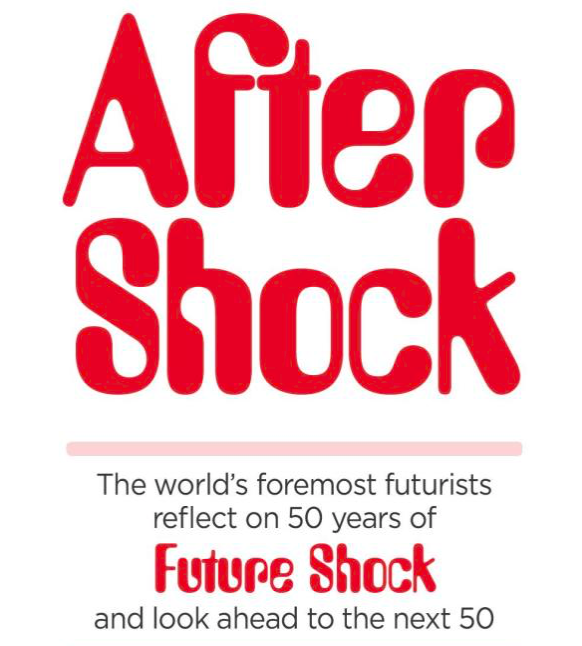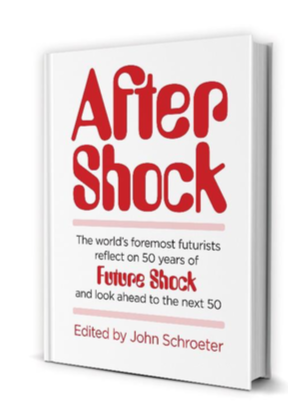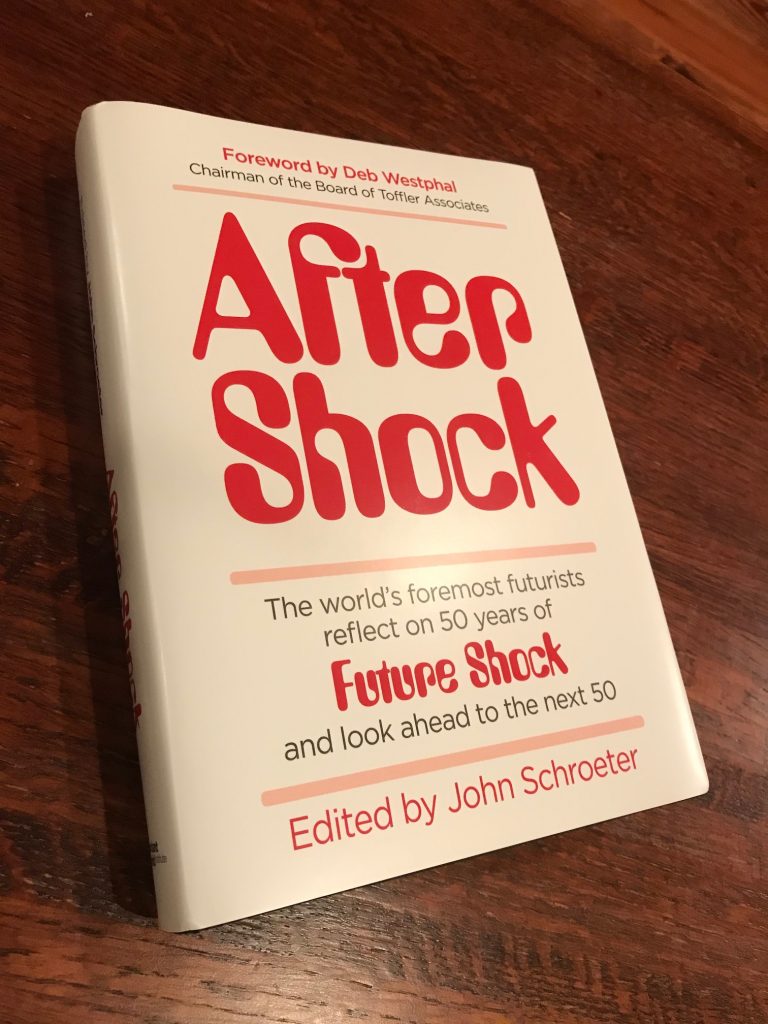
Here’s my chapter from the new book that’s just out looking back at Future Shock. The book, After Shock, can be bought here. US link here.
Future Shock @ 50.
One of the enduring issues futurists face is bad timing. Like science-fiction writers and technologists, futurists often believe that things will happen sooner rather than later. Future Shock, which accurately described the turmoil of the 1970s, is perhaps more accurate and relevant now than it was then. The book’s central idea, that the perception of too much change over too short a period of time would create instability, perfectly describes the volatility, uncertainty and confusion currently being created by geo-political events, climate change and technology, most of all digital technologies, that accelerate everything except our capacity to cope with change. Hence a global epidemic of anxiety that expresses itself in everything from the rise of mental illness to the mass prescription of painkillers and anti-depressants.
Looking backwards, it’s hard to imagine how the upheavals of the early 1970s could have be seen as shocking. Surely the pace of change then was glacial compared to what it is now? But we have largely forgotten about the seismic shift from ‘we’ to ‘me’ that accompanied the fading of the sixties and the blossoming of the seventies. Group love was replaced by empowered individualism. The invention of modern computing, which soon became personal computing, amplified the focus on the individual even further. Peace, too, was shattered, not only by the enduring war in Vietnam, but by the invention of international terrorism, while OPEC’s oil shock created inflation and economic uncertainty. Oh, and the US had a rogue President, which proves, to me at least, that some things do not change quite as much as we sometimes imagine.
Maybe the speed of change in the 70s wasn’t as rapid as today, but events back then were still alarming compared to the relative stability that had endured before. Global media made such events more visible too. Information Overload is idea championed in Future Shock and another that feels almost quaint when it’s used in the context of the 70s. Overloaded? Way back then? You cannot be serious.
The problem, of course, is that while many things did indeed change, and continue to do so today, we do not. Or, at least, we struggle to keep up. Edward O. Wilson, the American biologist, sums the situation up perfectly when he says that:
“Humanity today is like a waking dreamer, caught between the fantasies of sleep and the chaos of the real world.
The mind seeks but cannot find the precise place and hour.
We have created a Star Wars civilization, with Stone Age emotions, medieval institutions, and godlike technology.”
This clash, between technologies and behaviours that change rapidly (exponential is a word that’s thrown around with careless abandon, but rarely stacks up outside computing) and our brains which do not change as fast was seen by the Toffler’s as being injurious to not only our health, but to our decision-making abilities too.
Interestingly, decades after Future Shock was written, a study published by Angelika Dimoka, Director of the Centre for Neural Decision Making at Temple University, appears to support part of what the book proposed.
This study found that as information is increased, so too is activity in the dorsolateral prefrontal cortex, a region of the human brain associated with decision-making and the control of emotions. Yet eventually, if incoming information continues to flow unrestrained, activity in this region falls off. The reason for this is that part of the brain has essentially left the building. When information reaches a tipping point, the brain protects itself by shutting down certain functions. Outcomes include a tendency for anxiety and stress levels to soar and for people to abstain from making important decisions. Not so much future shock as present paralysis, perhaps.
Future Shock did not propose a solution to this problem.
The book, as the authors pointed out, was always more of a diagnosis than a cure, although education is mentioned as a critically important factor going forward. So too is a need to guard against change that’s either unguided or unrestrained.
This, again, is very much where we stand today. Technologies such as autonomous trucks, surgical robots and battlefield drones are being developed with little or no public debate.
If Tesla, for example, were Boeing or Bristol-Myers Squibb, I find it hard to imagine how their products would be allowed anywhere near the public at such a stage of development. As for artificial intelligence, the situation is even worse.
Broad or General AI could be the best or the worst invention humankind will ever make and yet there is hardly any broad discussion about the risks, let alone any public debate about what this technology is ultimately for. Like many other things, AI is largely being imposed upon people for economic gain and it is hard to see why it will enhance rather than diminish our humanity overall. However, this pessimistic view ignores two things I’ve learned about the future, which is that the future is not linear and it’s not binary either. Things will happen that nobody, especially futurists, saw coming and the most likely scenario is an uneasy balance between people wishing to push forwards and others wanting to pull back.
So, fifty years on, is there now a cure for Future Shock?
I think there is and I believe that we are beginning to see some early signs of it.
In my view, the central problem at the moment is not change or acceleration per se, but that we have lost trust in government, science, business, the media and even each other. We’ve also simultaneously lost our anchor points and thrown away our ballast, with the result that we are being tossed about in a high sea without any sign of land to navigate towards. No wonder we are feeling disorientated and somewhat nauseous.
It is this lack of direction, more than anything else, that is fuelling our anxiety in my view. But a simple solution is at hand. First, we need a moderate level of disconnection.
We need to stop treating all information as power and reclaim some control over what enters our brains. The information universe is infinite, but our attention spans and mental processing capabilities are not. More importantly, without a strong sense of identity, in other words a sense of whom we are and where we stand, we will continue to be thrown around by the slightest disturbance.
I’m not for a moment suggesting that we ditch our cell-phones or throw out our televisions in the style of Peter Finch in the movie Network, more than we consider more carefully the ideas that we let into our homes and our brains.
One we have regained some sense of calm and perspective we then need to talk to each other about where it is that we want to go in the future. How do we want to live? Even the ‘fact’ that the future has arrived all at once, which some people cite as being a source for many of our troubles, would be easy to deal with if we only knew what destination we were heading towards. Then, as Future Shock suggests, we could restrain or reject anything that impedes our progress.
Having a view of what lies ahead, a shared vision of a promised land if you will, would also allow us to focus more on the present and worry less about endless unknowns. We should spend far less time individually worrying about what might happen and much more time collectively thinking about what it is that we want to happen.
There are echoes of this happening already in everything from the growing disenchantment with our political elites and Big Tech to the criticisms that are emerging concerning globalisation and the sterile nature of free-market economics and the inequality of wealth and opportunity that results.
In my opinion, the next big thing will be a seismic shift concerning what we value, which is us. All we are waiting for is a trigger. People can feel that something or someone is coming already, although nobody has expressed it yet.
It is the absence of a future, and especially a future where humanity matters, that is being felt, but I believe we are on the cusp of changing things in the right direction.
As Future Shock says, we need to humanize distant tomorrows and the best way of doing this is to take control of the future. Whether we like it or not, we are on the cusp of developing technologies that will give us godlike powers. The simple question is what to do with this power. Who do we, as individuals, societies and a species, want to be?
Alvin Toffler died in 2016, his wife and co-author in 2019, and I think we all owe them a great debt. Not only did they place future thinking firmly on the world’s stage, they established a literary genre that continues to this day.
Richard Watson is the author of Digital Vs. Human and the founder of nowandnext.com


